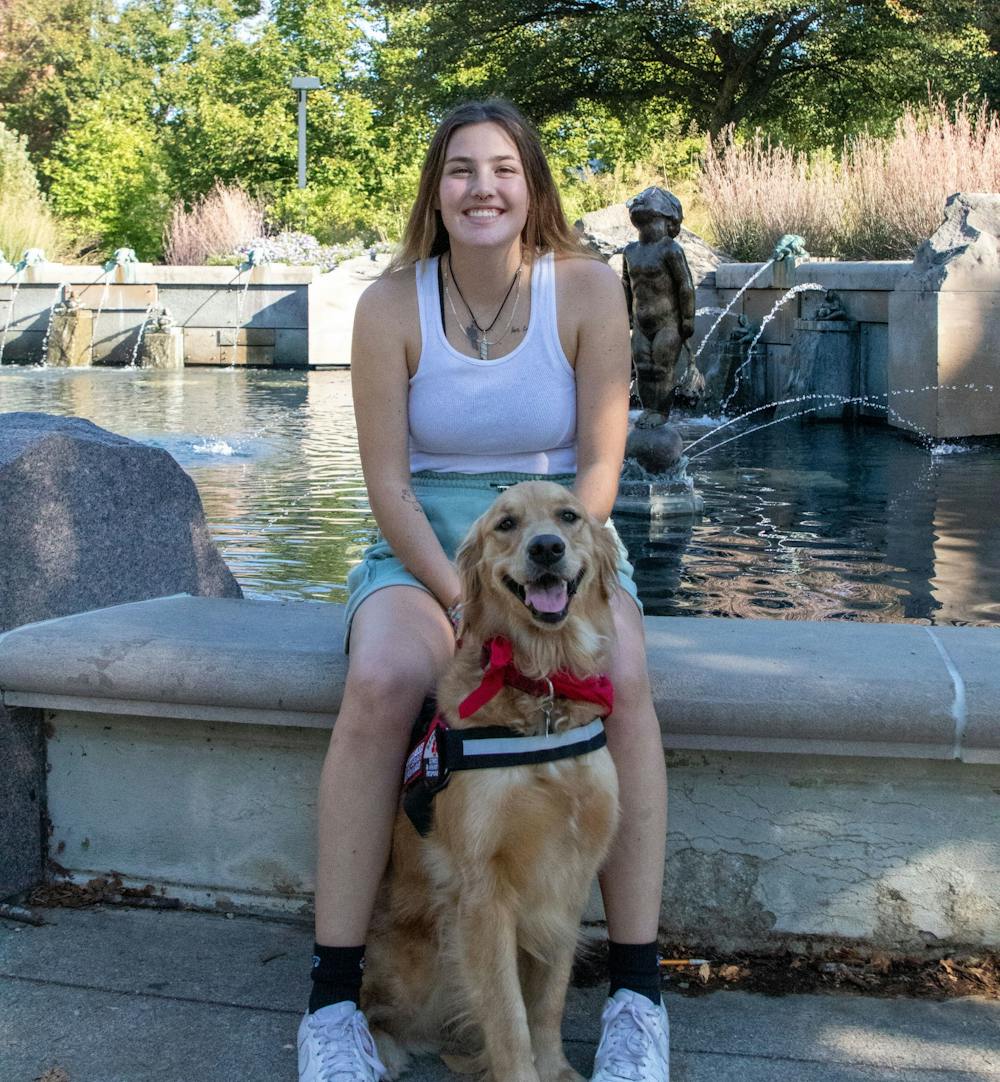According to Ball State’s Services for Students with Mobility Needs, emotional support and service animals are allowed in university housing as long as the student’s disability is documented with disability services and “there is a relationship between the disability and the assistance the animals provide.”
Like Star Wars’ Rey Skywalker, freshman nursing major Sara Harmeyer’s golden retriever, Rey, is caring and ready for a challenge. Rey is a psychiatric service dog named after the fearless and passionate female protagonist in the “Star Wars” films.
Harmeyer adopted Rey when she was a puppy from a breeder in southern Indiana. Two-year-old Rey is Harmeyer’s first service dog.
For six months, Harmeyer trained Rey how to sense her anxiety attacks and is currently teaching Rey how to retrieve her medication. Harmeyer said while she had to spread out Rey’s training because of her busy schedule, she learned relatively fast.
“I get very shaky before my anxiety attacks — that can be shaking my leg or fidgeting with my hands,” Harmeyer said. “[Rey] helps me with my anxiety and panic attacks and alerts me when she’s aware I’m having one.”
Any animal can be qualified as an emotional support animal, but the qualifications for a service animal are different. Service dogs are individually trained to do work or perform tasks for people with disabilities. According to the American Disabilities Act (ADA), dogs and — under separate regulations — miniature horses can be considered as service animals.
Before Harmeyer started her freshman year at Ball State, she reached out to Disability Services to let them know she was bringing Rey along for the fall semester.
Rey attends all of Harmeyer’s regular classes, Harmeyer said, but when the nursing major is in the laboratory, Rey does not tag along. When Harmeyer is having an “easy day” where she feels as though her anxiety isn’t so bad, she lets Rey stay in her dorm room.
“My anxiety was a lot worse before I got [Rey],” Harmeyer said. “It has gotten a lot better over time with her help, but I’ll still have bad flares of it. Even though she’s my service dog, she’s also my best friend. She has helped me a lot.”

When Rey is out around campus, she wears a vest to let others know she is working with Harmeyer, who has experienced people asking to pet Rey without her permission.
“You shouldn’t ask to pet Rey when she is working or even interact with her,” Harmeyer said. “People shouldn’t shout her name — it distracts her.”
Sophomore film major Shea Moloney has an emotional support ferret on campus. Their ferret, Mochi, helps them with their attention deficit disorder (ADD), symptoms of anxiety and post-traumatic stress disorder (PTSD). In September 2020, Moloney decided it was time to have an ESA. They adopted Mochi this past July from a pet store.
“For me, ADD is a blanket term for all the different things going on,” Moloney said. “I’ve had those symptoms for as long as I can remember — I was getting so stressed and overwhelmed. I figured that I’d wait until next year to have [an emotional support animal].”
When it came to choosing which animal to adopt, Moloney considered both cats and dogs before settling on a ferret, as they felt it would be easiest to take care of and adapt the best to life in a college dorm.
“Ferrets are basically like cats in rodent packages,” Moloney said. “I felt like a dog would’ve been too difficult to keep taking outside, and a cat would feel cooped up [in a dorm].”

Because Mochi is only 8 months old, Moloney said the biggest challenge when training him is teaching him where to go to the bathroom. When Moloney takes Mochi on walks around campus, they said they experience mixed reactions from students.
“50 percent of people want to stop and pet him, and 50 percent of people are weirded out,” Moloney said. “Some think it’s funny, too.”
Marcy Hintzman, research specialist at Great Lakes American Disabilities Act Center, works to keep people educated on the ADA and its policies. She said one of the most common misconceptions people have is the difference between a psychiatric service dog and an emotional support animal.
According to the ADA, a psychiatric service dog is considered a service animal if the dog is individually trained to do work or perform tasks for people with disabilities. For example, a psychiatric service dog senses an anxiety or panic attack, then takes action to relieve the problem such as retrieving medication. If the dog simply provides emotional support, it is not considered a service animal.
Hintzman said she had an interesting encounter with a colleague who had a service animal and a passerby.
“The person was trying to hold the leash of the animal and help out my colleague while they really didn’t need it,” Hintzman said. “They didn’t understand that they could just ask my colleague if they needed help.”
There are things that should and shouldn’t be done when passing a service animal, Hintzman said. Because service animals are on duty, passerbys should not pet or whistle at them.
“Just remember that their animal is an extension of themself,” Hintzman said. “It’s their personal space, assisted device and property. I wouldn’t want someone leaning or touching me without my permission — it’s all about respect. If you’re not sure what to do, just ask.”
Contact Tori Smith with comments at tnsmith2@bsu.edu or on Twitter @tori_ncl_writer.

![Sara Harmeyer and her golden retriever, Rey, sit proudly under the bells of Shafer Tower Oct. 1. “[Rey] goes longboarding with me and we go on lots of walks,” Harmeyer said. “She also gets lots of attention and play time from me and my friends.” Tori Smith, DN.](https://snworksceo.imgix.net/bsd/ee9bbfce-50cf-4f44-84c6-547cc88ab9c5.sized-1000x1000.jpg?w=1000)



